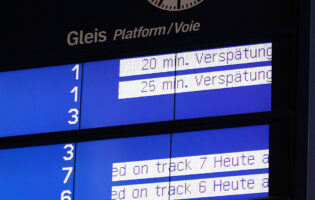
The Limits and Opportunities of Reconciliation with West Germany During the Cold War: A Comparative Analysis of France, Israel, Poland, and Czechoslovakia

Lily Gardner Feldman
Senior Fellow
Dr. Lily Gardner Feldman is a Senior Fellow at AICGS. She previously served as the Harry & Helen Gray Senior Fellow at AICGS and directed the Institute’s Society, Culture & Politics Program. She has a PhD in Political Science from MIT.
From 1978 until 1991, Dr. Gardner Feldman was a professor of political science (tenured) at Tufts University in Boston. She was also a Research Associate at Harvard University’s Center for European Studies, where she chaired the German Study Group and edited German Politics and Society; and a Research Fellow at Harvard University’s Center for International Affairs, where she chaired the Seminar on the European Community and undertook research in the University Consortium for Research on North America. From 1990 until 1995, Dr. Gardner Feldman was the first Research Director of AICGS and its Co-director in 1995. From 1995 until 1999, she was a Senior Scholar in Residence at the BMW Center for German and European Studies at Georgetown University. She returned to Johns Hopkins University in 1999.
Dr. Gardner Feldman has published widely in the U.S. and Europe on German foreign policy, German-Jewish relations, international reconciliation, non-state entities as foreign policy players, and the EU as an international actor. Her latest publications are: Germany’s Foreign Policy of Reconciliation: From Enmity to Amity, 2014; “Die Bedeutung zivilgesellschaftlicher und staatlicher Institutionen: Zur Vielfalt und Komplexität von Versöhnung,” in Corine Defrance and Ulrich Pfeil, eds., Verständigung und Versöhnung, 2016; and “The Limits and Opportunities of Reconciliation with West Germany During the Cold War: A Comparative Analysis of France, Israel, Poland and Czechoslovakia” in Hideki Kan, ed., The Transformation of the Cold War and the History Problem, 2017 (in Japanese). Her work on Germany’s foreign policy of reconciliation has led to lecture tours in Japan and South Korea.
The following chapter appears in the new book “The Transformation of the Cold War and the History Problem,” edited by Hideki Kan. Download the full chapter.
The seventieth anniversaries in 2015 of the end of World War II and the Holocaust have generated renewed interest in reconciliation and the question of whether the German and European experience holds lessons for Japan and East Asia. Much of the thinking on comparative lessons, developed in the last fifteen years, has focused on an idealized notion of Germany’s successful international reconciliation. In the universe of reconciliation practice, Germany indeed stands out for its consistent, continuing and comprehensive confrontation with the past. A neglected topic, however, is the reality that Germany’s reconciliation with former enemies has been a long, messy and non-linear process, punctuated by crises. The work on Germany as a model for reconciliation has almost exclusively focused on the perspective and actions of the perpetrator and much less on the victims’ stance. The analysis here addresses these lacunae by examining the vicissitudes in how Germany’s former enemies – France, Israel, Poland, Czechoslovakia -responded to post-war Germany, culminating in their reactions to the ultimate test of reconciliation’s robustness: German unification.
The chapter has three purposes: an analysis of how the governments of the four countries dealt with the German Question from 1949-1990; an examination of the approaches of societal actors to Germany in the same period (itself an under-researched topic); and an understanding of the responses to Germany’s unification process in 1989-1990. Together the three arenas reveal the complexity, variety and diversity of reconciliation.
I will show that “reconciliation” was the main governmental reaction to West Germany in a divided Europe, in highly developed, institutionalized fashion for France and for Israel, and in incipient form even for Poland after 1970; that societal actors, i.e. domestic forces, were a central dimension of reconciliation with Germany for France and Israel, and were important even in Poland and, to a lesser extent, Czechoslovakia; that the international context of the Cold War helped determine the opportunities and limits of reconciliation; and that attitudes to German unification in all four cases were linked to the nature of reconciliation before 1989.
By “reconciliation” I mean the process of building long-term peace between former enemies through bilateral institutions across governments and societies. Reconciliation as a complex and complicated process involves the development of friendship, trust, empathy and magnanimity (not forgiveness). This concept does not infuse peace with a vision of harmony and tension-free coexistence, but rather integrates differences. Productive contention unfolds in a shared and cooperative framework that identifies and softens, but does not eliminate, divergence. Contention is a more realistic goal than perfect peace.
By the “German Question,” I mean three realities of German power determined by the period of elaboration: before 1945, united Germany as hegemonic, expansive, and militaristic; after 1945, Germany as divided, with its western part tamed and a “civilian power;” after 1989, Germany reunified in a uniting Europe with its leadership largely accepted. Read more.









